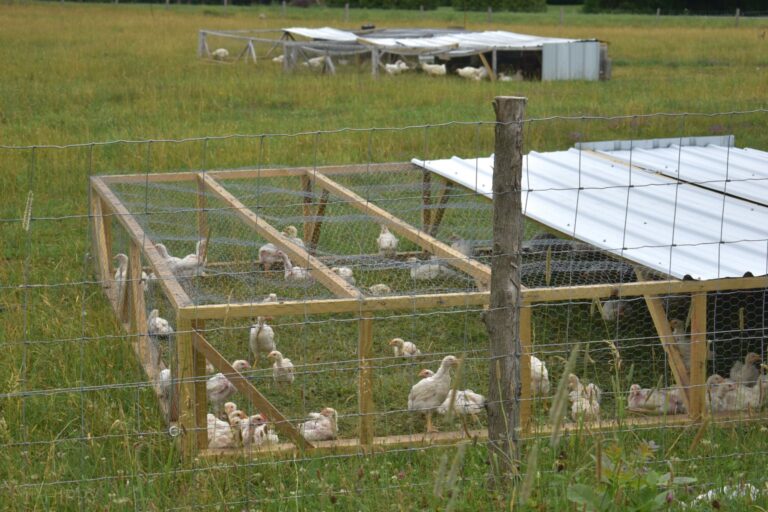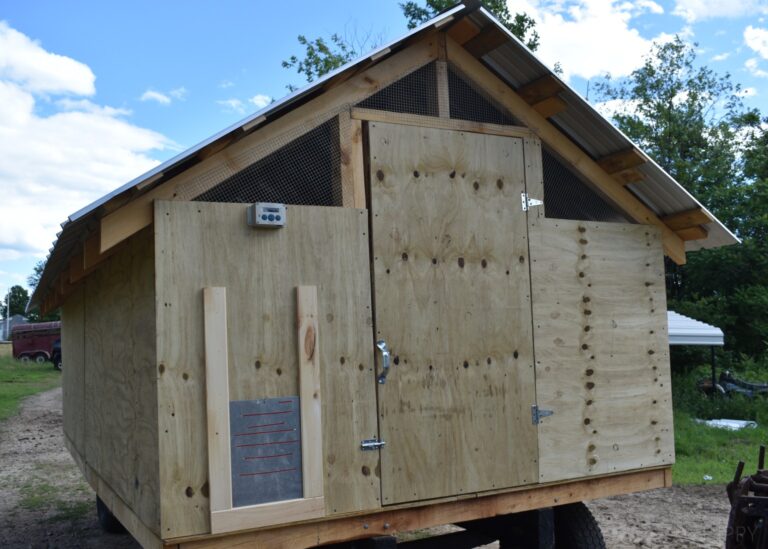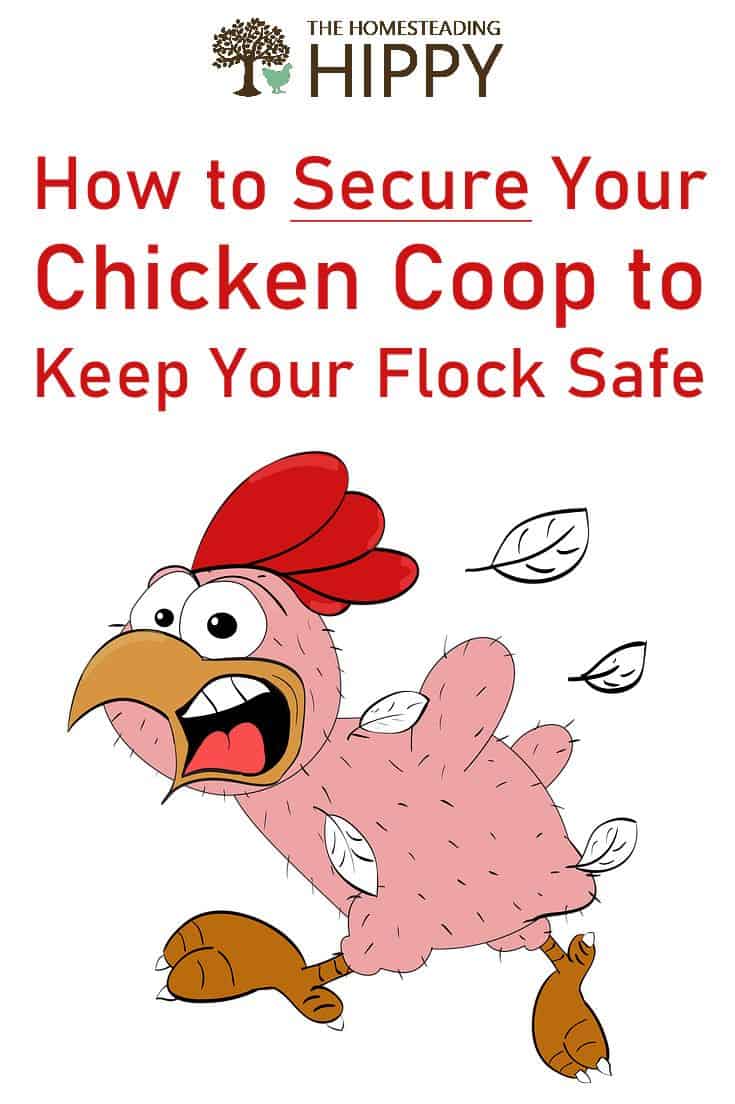Although raising chickens is one of the easiest ways to get started with livestock, the reality is that they aren’t totally without effort.
You love chickens, right? Well, so do a large variety of predators…

These opportunistic creatures are just waiting for the perfect moment to go after your birds – and they will take advantage of any weak spots in your coop. Don’t worry, if anything isn’t secure, those raccoons will let you know!
And raccoons are far from the only creatures that can wreak havoc on your flock. From weasels to skunks, snakes to bobcats, there are all kinds of animals just waiting for a bite of a tasty chicken.
Where I live, the biggest threat to my chickens comes from foxes and weasels (although hawks aren’t anything to be messed with, either).
For many years, my husband and I had to maintain a vigilant guard over our chickens, watching for signs of predators.
Unfortunately, “keeping an eye” on your chicken is much easier said than done – especially when you work away from the home and have plenty of other things to do in a given day. One summer, we lost more than two dozen chickens to a single greedy fox.
After that, we decided we needed to rethink our chicken coop and run design.
We now raise our chickens almost exclusively in chicken tractors and mobile chicken coops, but there are plenty of ways you can shore up even a fixed-location coop to make it resistant to threats from predators.
Here are some ways you can secure your chicken coop to keep your flock safe – no matter where you live or how many chickens you might have.
Know What Kind of Predators Are In Your Area
The most important thing you can do to prepare yourself for a predator threat is to figure out what kinds of predators live in your area in the first place. Some predators will go after the chickens themselves, their eggs, or often both.
Some of the most common chicken predators include hawks, owls, eagles, coyotes, weasels, fisher cats, and raccoons. You might also have to worry about opossums, rats, foxes, minks, badgers, and bobcats. Even domestic cats and dogs can go after chickens.
Don’t forget that predatory habits and prevalence changes with the seasons, too. In the spring and fall, many flying predators are on the move. If you live in a natural flyway, you may have more predator pressure at these times of the year.
Keep the Coop Clean
An easy way to secure your chicken coop is to make sure it’s spic-and-span at all times. Sure, this will protect your chickens from health-related hazards – but it can also protect against predators, too.
A clean coop is less likely to invite predators like raccoons and rats. If your feed is stored in watertight and airtight containers, it can’t get moldy or spoil.
Don’t invite predators to your chicks with a smorgasbord of menu options! Make sure all feed is cleaned up, so your chickens stay safe.
Avoid Chicken Wire
Chicken wire isn’t always the best at keeping predators out – that’s ironic, given the name. It’s really better at keeping chickens out. There are plenty of predators, including snakes, raccoons, rats, and fisher cats, that can get to your chickens through the wire.
They might not even be able to fit their bodies through the wire, but they can reach a paw in and pull out pieces of your chickens – that’s just as gruesome as it sounds.
Instead, use ½ inch hardware cloth. This will keep your chickens contained and it will keep predators away, too.
Never Let Chickens Roost Outside
You’ve spent so much time and energy designing the perfect predator-proof coop – don’t waste all of your hard work by allowing your chickens to roost outside.
Teach your chickens early on – when they are first moved to the coop – that they need to sleep inside the coop, and that’s what is home. You’ll be grateful that you did later on!
Don’t Forget About Diggers and Flyers
When you’re building your chicken coop, it’s easy to assume that, if the coop has ground contact, you’re good to go – no daylight peeking through, no worries.
However, there are plenty of predators, including coyotes and foxes, that can get inside your coop in mere minutes by digging beneath the housing. To get around this, surround a chicken pen with a two-foot wide radius of hardware cloth, burying it several inches below the ground’s surface.
You also have to worry about the aerial predators. Those that can fly (or climb) can easily get into your coop if the ceiling or roof is uncovered.
Make sure you have a roof over both your coop and run, even if it’s just mesh. This will prevent predators from getting to your birds while they’re out and about, too.
Lock Your Chickens Inside
Make sure you lock the coop each night, and regularly inspect it for any gaps, cracks or holes. These present areas for common chicken predators to get inside. Even a tiny hole is enough for a snake or rat to get through.
Use high-quality locks, too, because there are plenty of animals that can figure out locks that are basic enough to keep even small children out.
Raccoons, for example, have the deftness of a two-year-old child, on average! Make sure all locks are high-quality and have two-step locking and unlocking mechanisms to keep predators out.
If you aren’t interested in going out to the coop each night to lock your chickens in – and going back out in the morning to open the door – you may want to invest in an automatic coop door opener:
These work based on a timer (which can be programmed to a specific time or on the rising and setting of the sun) and will do the work for you. They cost several hundred dollars, but they take much of the stress and hassle out of caring for chickens for users.
Raise the Coop
When you’re building your chicken coop, one of the easiest ways to secure it against predators is to elevate it a bit.
It only needs to be off the ground by foot or so, but this will discourage low-to-the-ground predators like rats, skunks, and snakes from getting access to your flock.
Notice the elevation on mine:

These animals tend to hang out beneath a coop, and will slip up inside.
Enclose the Coop with a Run
Most people do this, anyway, but if your chicken coop isn’t already surrounded by a fence, make sure you build one immediately.
There are all kinds of options you can use, including welded wire mesh, electric netting, and poultry wire. Just make sure the openings are small enough to keep your predators of concern far away.
Solid Floors Only
You might feel tempted to use a mesh floor in your chicken coop. This will let all of the chicken droppings fall straight through to the ground so you don’t have to worry as much about clean-up.
However, there’s a serious problem presented with this idea, and that’s the fact that it makes it much easier for critters to get inside.
A solid floor will keep burrowing invaders like raccoons and rats from getting inside, as it takes them more time to chew on the coop.
Surround the Bottom with Electricity
Another way you can secure the bottom of your coop is to place a single electric wire close to the ground. This will prevent predators like raccoons and rats from getting inside, as they’ll get their noses shocked when they try to burrow in.
Examine Your Seams
The coop is only as secure as the seams between the boards. Caulking will help keep the elements out, but as the caulk wears away, the seams become potential entry points for opportunistic predators.
You may want to add some cross beams on the interior of the coop – and check for knots, which also offer weak points.
Get Rid of “Cover”
If your chicken coop is surrounded by dense vegetation, you’re creating hiding spots for predators.
Most animals, like raccoons, don’t want to sit around in the open while they’re trying to figure out how to get into a coop – it makes them more vulnerable to attack, too. Instead, get rid of all the plants.
That said, you only want to get rid of vegetative cover. Leave some cover – like the underbelly of your coop – exposed so that your chickens have somewhere to run in case an aerial predator decides to strike.
Don’t Forget About the Windows
Not all chicken coops have windows, but if yours does, make sure it can shut and lock fully from the inside. If you can easily lift a window, so, too, can a raccoon.
Check Your Coop Vents
Good ventilation is essential in a chicken coop – but make sure you have secure ventilation. If your coop’s ventilation openings are covered in quarter-inch hardware mesh, that’s great – but how well is it attached to the coop.
If you attached the corners with flimsy nails, you might need more. Use screws instead.
Invest in a Rooster
A rooster isn’t foolproof, but having one of these big guys around can definitely help to protect your flock.
Roosters have built-in instincts that alert them to danger – and they’ll use their protective instincts to care for the rest of the flock, too. They will sound the alarm whenever predators get close, ushering the rest of the flock to safety.
If the area you live in permits owning roosters, this might be something for you to consider.
You could also invest in a livestock guardian animal, but these need to be very well trained.
Install Some Motion Activated Lights
There are some predators that won’t care how well-lit an area is if there’s a chicken dinner on the table, but certain animals can be deterred by motion-activated lights. They prefer to work in the dark, and will run away when the lights turn on.
Try Electric Fencing
This won’t keep aerial predators out – or those that are small and can slip through cracks and gaps in wires – but if you have large predators, like bears and bobcats, to worry about, consider installing some electric fencing. This can keep the big guys out and help protect your chickens.
Regularly Switch Things Up
Predators are smart – probably a lot smarter than you are giving them credit for. They will get used to routines and they’ll get used to your old defensive techniques.
If you use a method of deterrent like a scarecrow to keep predators away, they’re going to get used to iti in a matter of a few days.
Identify Culprits
If you are unfortunate enough to suffer from predator losses, do your best to identify the kind of predator that killed your bird.
Sure, the chicken is already dead – but knowing what killed it can help you prevent losses in the future. You will be better equipped to protect the rest of the birds.
Before you consider – ahem – “dispatching” the predator, make sure you look into local and national laws, too. Protecting your chickens might sound like a simple enough concept, but you need to be careful about the legal implications of doing so.
Limit Free-Ranging – and Keep the Coop Secure
Ultimately, chickens are the most vulnerable to threats from predators when they are out and about, free-ranging in the garden and yard.
Supervising them and making sure they aren’t out free-ranging when there is a risk of predator attack is the very best thing you can do.
However, there are some predators that will go after chickens while they’re sleeping in the coop – which is why it’s important to be vigilant about how your coop is constructed.
By following these tips on how to secure your chicken coop to keep your flock safe, you’ll be able to keep everybody secure – and free from a threat. No more stress!


Rebekah is a full-time homesteader. On her 22 acres, she raises chickens, sheep, and bees, not to mention she grows a wide variety of veggies. She has a huge greenhouse and does lots of DIY projects with her husband in her ever-growing homesteading endeavor. Learn more about Rebekah here.

My advice is to get a livestock guardian dog. We have 14 acres, 6 cows, 7 llamas, a couple of goats, a dozen chickens and about 50 guinea fowl. We protect all of this with a female Great Pyrenees. She’s just over 2 years old and the best dog I’ve had to date. She keeps skunks, raccoons, possums, armadillos and hawks off the property. She will actually run under a hawk and bark up at it. The only thing we lose birds to is old age.